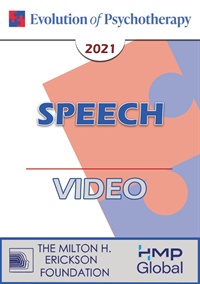
- Average Rating:
- Not yet rated
- Topic Areas:
- Speeches
- Categories:
- Evolution of Psychotherapy | Evolution of Psychotherapy 2021
- Faculty:
- Claudia Black
- Course Levels:
- Master Degree or Higher in Health-Related Field
- Duration:
- 1 hour
- Format:
- Audio and Video
- Original Program Date:
- Dec 04, 2021
- Short Description:
- Working with the young adult with addictive disorders most frequently involves addressing the experience of bullying, physical and sexual abuse, emotional abandonment and loss. These dynamics are significant in addressing the more frequent co-occurring disorders of anxiety and depression. This presentation will also offer a framework for treatment strategies.
- Price:
- $59.00 - Base Price
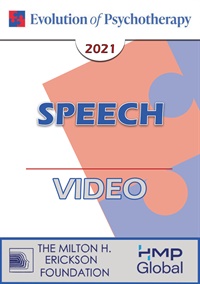
- Average Rating:
- Not yet rated
- Topic Areas:
- Speeches
- Categories:
- Evolution of Psychotherapy | Evolution of Psychotherapy 2021
- Faculty:
- Harville Hendrix | Helen LaKelly Hunt
- Course Levels:
- Master Degree or Higher in Health-Related Field
- Duration:
- 1 hour
- Format:
- Audio and Video
- Original Program Date:
- Dec 04, 2021
- Short Description:
- When the Space-Between rather than the Space-Within becomes the source of experience, by implication it is the location of therapeutic intervention. This speech will discuss the shift from the individual to the relational paradigm as the new domain of therapeutic intervention.
- Price:
- $59.00 - Base Price
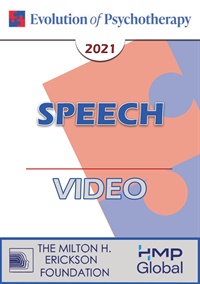
- Average Rating:
- Not yet rated
- Topic Areas:
- Speeches
- Categories:
- Evolution of Psychotherapy | Evolution of Psychotherapy 2021
- Faculty:
- Peter Levine
- Course Levels:
- Master Degree or Higher in Health-Related Field
- Duration:
- 1 hour
- Format:
- Audio and Video
- Original Program Date:
- Dec 04, 2021
- Short Description:
- WHAT IS TRUER THAN TRUTH. ANSWER: THE STORY. AN UNSUSPECTING AND RELUCTANT PROPHET. WE ALL HAVE OUR STORIES TO TELL, AND THIS IS MINE. IT IS MY TRUTH.
- Price:
- $59.00 - Base Price

- Average Rating:
- Not yet rated
- Topic Areas:
- Conversation Hours | Psychotherapy
- Categories:
- Evolution of Psychotherapy | Evolution of Psychotherapy 2021
- Faculty:
- Martin Seligman, PhD
- Course Levels:
- Master Degree or Higher in Health-Related Field
- Duration:
- 1 hour
- Format:
- Audio and Video
- Original Program Date:
- Dec 04, 2021
- Short Description:
- A conversation hour with Martin Seligman, PhD from the 2021 Evolution of Psychotherapy Conference.
- Price:
- $59.00 - Base Price
Tags: Psychotherapy
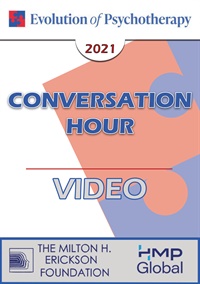
- Average Rating:
- Not yet rated
- Topic Areas:
- Addiction | Conversation Hours
- Categories:
- Evolution of Psychotherapy | Evolution of Psychotherapy 2021
- Faculty:
- Claudia Black, PhD
- Course Levels:
- Master Degree or Higher in Health-Related Field
- Duration:
- 1 hour
- Format:
- Audio and Video
- Original Program Date:
- Dec 04, 2021
- Short Description:
- The acronym ACA or ACoA has been a part of the therapy community for several decades now. As the pioneer in the framework for its meaning and influence in the recovery field , Claudia Black will discuss her history with the meaning and the value this terms offers the client. She will also offer a framework for healing the family of origin issues that often contribute to depression, anxiety, relationship conflict and addiction relapse.
- Price:
- $59.00 - Base Price
Tags: Addiction
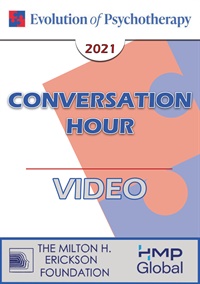
- Average Rating:
- Not yet rated
- Topic Areas:
- Conversation Hours | History of Psychotherapy | Psychotherapy
- Categories:
- Evolution of Psychotherapy | Evolution of Psychotherapy 2021
- Faculty:
- Jeffrey Zeig, PhD
- Course Levels:
- Master Degree or Higher in Health-Related Field
- Duration:
- 1 hour
- Format:
- Audio and Video
- Original Program Date:
- Dec 04, 2021
- Short Description:
- Dr Zeig will discuss and answer questions about some of the psychotherapy masters he has encountered, including Viktor Frankl, Milton Erickson and Virginia Satir.
- Price:
- $59.00 - Base Price
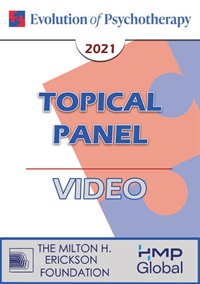
- Average Rating:
- Not yet rated
- Topic Areas:
- Topical Panels
- Categories:
- Evolution of Psychotherapy | Evolution of Psychotherapy 2021
- Faculty:
- Steven Hayes, PhD | Michael Yapko, PhD | Donald Meichenbaum, PhD
- Course Levels:
- Master Degree or Higher in Health-Related Field
- Duration:
- 1 hour
- Format:
- Audio and Video
- Original Program Date:
- Dec 04, 2021
- Short Description:
- Therapy happens in life, not just in the consulting room. Assignments facilitate treatment goals.
- Price:
- $59.00 - Base Price
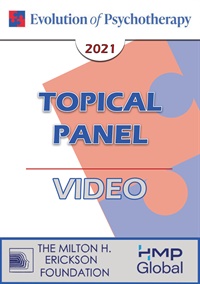
- Average Rating:
- Not yet rated
- Topic Areas:
- Topical Panels
- Categories:
- Evolution of Psychotherapy | Evolution of Psychotherapy 2021
- Faculty:
- Ellyn Bader, PhD | Harville Hendrix, PhD | Helen LaKelly Hunt, PhD
- Course Levels:
- Master Degree or Higher in Health-Related Field
- Duration:
- 1 hour
- Format:
- Audio and Video
- Original Program Date:
- Dec 04, 2021
- Short Description:
- The underlying principles of couples therapy differ from individual therapy for both assessment and treatment. The panelist will discuss and contrast their models.
- Price:
- $59.00 - Base Price
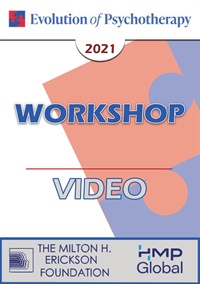
- Average Rating:
- Not yet rated
- Topic Areas:
- Workshops
- Categories:
- Evolution of Psychotherapy | Evolution of Psychotherapy 2021
- Faculty:
- Stephen Gilligan, PhD
- Course Levels:
- Master Degree or Higher in Health-Related Field
- Duration:
- 2 hours
- Format:
- Audio and Video
- Original Program Date:
- Dec 04, 2021
- Short Description:
- Verbal conversations alone cannot produce sustainable change: somatic intelligence must be an integral part of sustainable change; verbal conversations are not sufficient. This workshop will experientially explore how to creatively use the related methods of Gendlen's "felt sense" and Gilligan's "relational trance".
- Price:
- $59.00 - Base Price
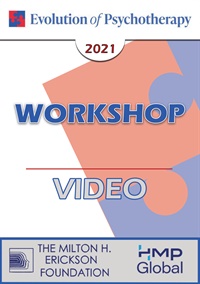
- Average Rating:
- Not yet rated
- Topic Areas:
- Workshops
- Categories:
- Evolution of Psychotherapy | Evolution of Psychotherapy 2021
- Faculty:
- Sue Johnson, EdD
- Course Levels:
- Master Degree or Higher in Health-Related Field
- Duration:
- 2 hours
- Format:
- Audio and Video
- Original Program Date:
- Dec 04, 2021
- Short Description:
- This workshop will teach the application of the EFT Tango - and show its use across three modalities - Individual, couple and family therapy. How the Tango process impacts depression and anxiety will be explicated. Clinical sessions will be viewed and experiential exercises offered.
- Price:
- $59.00 - Base Price
Please wait ...

